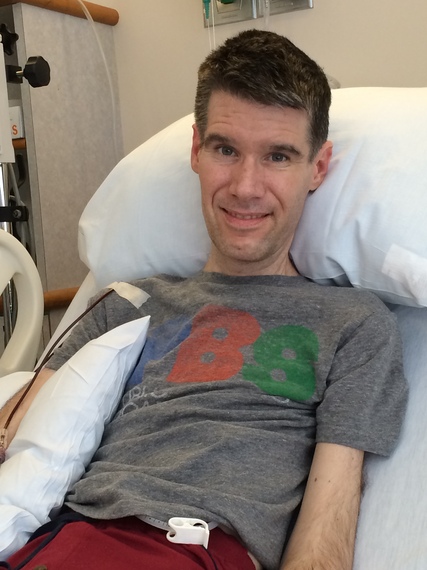It's almost two months since my last blog post. At the time, I was in a weakened state and had lost a tremendous amount of weight. After nine years of fighting, ALS seemed to be finally winning.
Albeit late in the game, I decided to have a feeding tube, or percutaneous endoscopic gastrostomy (PEG) tube, surgically placed in my stomach. It helps a person who is having ongoing and serious trouble swallowing and can't get enough food or liquids by mouth.
After talking to several doctors and other people with ALS, everyone told me the PEG placement would be a "piece of cake." Unfortunately, for me and my husband Mark, that was not the case.
The initial surgery seemed to go well, but a few days following we noticed my bandage started to saturate with blood. My visiting nurse was a bit worried but our surgeon reassured us it was normal post-surgery bleeding. Flash forward several days later -- I wake up from a nap in a literal pool of blood straight out of a horror movie. Mark calls an ambulance and we race off to the emergency room. The ER doctor consults with my surgeon. They agree to place a special type of surgical tape around the around the surgery site. A few hours later the bleeding stops and they release us from the ER.
Two days later I wake up in another pool of blood. Once again Mark calls an ambulance and we are off to the ER.
Once there, we wait. Finally the ER doctor takes a look at my PEG site and seems pretty nervous. She tries to reach my surgeon but it takes forever. After several hours, the doctor and nurse come back into my room to take a peek at the PEG tube. As they remove the bandages, what emerges is an orange-size "ball" of goop. Their initial reaction is that it's either my intestine or stomach popping out from the surgery site. Not sure, they decide to keep whatever it is moist by covering it with damp cloths.
Finally a GI specialist pays me a visit and looks at the ball. He then advises Mark to cover up in a surgery robe and full-on "riot gear" plastic mask -- "just in case." Then he starts poking the ball... Now remember, at this point, we are thinking it's my intestine. He pokes the ball harder and then starts tearing at it -- like really going at it. Piece by piece he rips the ball apart until there's nothing left. He then says that I had a hematoma and that only 1 percent of patients ever have this kind of reaction. The hematoma formed a mass and literally burst out of my stomach like the creature in the first "Alien" movie. "Bad luck" he says... Later I'm stitched up and kept overnight for observation. Then I go home.
I have been fighting a PEG tube for long time. But never in my wildest imagination would I think the experience would turn into a gore fest. So, what did I learn from all of this? First, demand that your doctor pay attention to you when you feel something is wrong, even if he or she continually reassures you that everything is "fine." Second, listen to your nurse -- mine diagnosed the hematoma well before any of the ER visits. Third, don't rely on anyone but you and your family to get the answers you deserve. You must advocate for yourself.
Was the PEG tube surgery the right decision? I have gained some weight, but the trauma from the surgery has taken a toll. I'm still pretty weak and tired. After this and some earlier set-backs, I am finding it harder to keep up the fight. That said, I am not giving up yet.
For me the jury is out. I am taking things one day at a time and looking forward to the spring and summer. As they say, only time will tell.
Randy Pipkin is a consummate ALS fighter. He supports the ALS Association Massachusetts Chapter's Walk to Defeat ALS and recently was the national campaign chair of Breakthrough ALS for the ALS Therapy Alliance.
